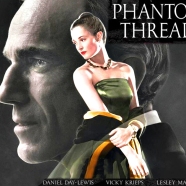 February
01
February
01
Tags
Phantom Thread (2017)

There is no simple way to describe Phantom Thread (2017). It is complex and multi-layered, with exquisite filming, extraordinary acting, and an engaging narrative. It is also deceptive. What appears to be a period drama of romance and high fashion is closer to a dark, double character study, wrapped in a psychological thriller, overlaid with a satire on haute couture.
In 1950s London, the elegant House of Woodcock is where royalty and high society go for gowns made by revered fashion designer Reynolds Woodcock (Daniel Day Lewis). He is an obsessive-compulsive personality type who needs complete control of everything around him. His career began by making his mother’s wedding dress. Having never recovered from her death, he forever wants to create her image through his art. Sister and salon manager Cyril (Lesley Manvile) is the only person close to him and she wards off casual lovers as quickly as he tires of them. Young waitress Alma (Vicky Krieps) is different: she is awkward, bold, perfectly formed, and he wants to possess her. She is soon absorbed into the House of Woodstock as model, muse, then wife in a tense relationship where each wants to control the other. Alma struggles to please Reynolds and Cyril’s constant watch does not help. One day she learns about toxic mushrooms and stumbles upon a novel way to make Reynolds need her.
At one level, the storyline is transparently simple; at another, it is an intricate portrait of two damaged people who progressively peel back each other’s social and emotional disguise. Reynolds is manipulative, fastidious, and judgemental, but vulnerable and forever searching for a surrogate mother. Alma’s innocent appearance hides her own calculated determination to find his weakness and turn it into dependence on her. Without knowing it, they are perfect for each other.
The sumptuous cinematography dwells on the minutiae of this claustrophobic world: his love of fabric as a canvas for capturing beauty; his obsessiveness about how a meal should be presented; his revulsion at the slightest sound that intrudes into his space; and his disgust when unworthy women wear his creations. The camera tracks the shifting tension point of his overbearing dominance and her measured acquiescence in a sexless film that oozes repressed, even perverse, sexuality. Against this façade of fashion elevated to art, wealthy high-born women parade in Woodstock garments, radiating material beauty to mask their ugly selves.
This is a film rich in thematic ambiguity that remains open to interpretation all the way to its twisted climax. Alma’s motives are left vague, and it is unclear if Reynolds is a subliminal cross-dresser, a neurotic artist, or a toxic bully looking for control through the world of high fashion. Regardless of how you read the film, the performances of Daniel Day Lewis and Vicky Krieps are mesmerising. At two hours and ten minutes, it could have achieved more impact with thirty minutes edited out, but not all will agree. That’s a small complaint for a film that offers so much style and so much substance about so little.

Director: Paul Thomas Anderson
Stars: Daniel Day Lewis, Vicky Krieps, Lesley Manvile

Richard, what a lovely review. I loved the film for all your reasons. I never even thought of a “ cross-dresser” ! However!
It is a film lovers’ film to be sure. Tableaux after tableaux of sumptuous scrumptiousness.
LikeLiked by 1 person
Thank you. I love your “Tableaux after tableaux of sumptuous scrumptiousness.”
LikeLike
Fine review. I really went for this film and I’m not a huge PTA fan. I loved it so much I went in and changed my Top 10 of 2017 post. It had that much of an effect on me.
LikeLiked by 1 person
I’m with you on this one Keith; I’m tempted to do the same.
LikeLike
Fabulous review. If anyone can carry a 2.5 hour film, Daniel Day Lewis is the guy. I’ve got to see this one.
LikeLiked by 1 person
It is a standout film with everything going for it except a brisk pace of direction. I’ll be interested to hear your thoughts after you see it.
LikeLike
I agree with everything you’ve said, and then some. There were three characters dancing in that ‘pas de deux’. Sister Cyril played an integral role! Every time her icy presence arrived on the scene I’m sure I felt my body tense.
A great psychological study!
LikeLiked by 1 person
Thanks for commenting nitya47.
LikeLike
Excellent review, I appreciated your differing interpretations of Reynolds, and your phrasing as ever is exquisite. I am curious what you would have cut from the film to shorten its running length?
I think Phantom Thread is a remarkable white gothic that is bathed in loss and innocence. If the essence of a gothic story is in its portrait of a decaying and forlorn house that is a stand-in for the protagonist’s soul, then Thread is steadfast in subverting this usual conception of the genre. In stark contrast to large and looming ecclesiastical buildings with flickers of shadows emerging from candlelight: Reynolds’ luxury fashion house looks like a pristine and elaborate doll’s house with white walls that are decayed by the bright beams of the morning sun.
LikeLiked by 1 person
Thanks for your thoughtful comments. In terms of length, I would advocate shortening the prolonged moments rather than actually deleting scenes. The lingering camera creates the pensive mood and expanded space, but the technique needs to be used more sparingly. I like your phrase “white gothic that is bathed in loss and innocence.”; the beauty of the film lies in its ambiquity and its ability to accommodate a variety of readings.
LikeLike
I wonder if this is truly retirement time
LikeLike
I’m on the edge of my seat wanting to know what you mean.
LikeLike
For DDL
LikeLike